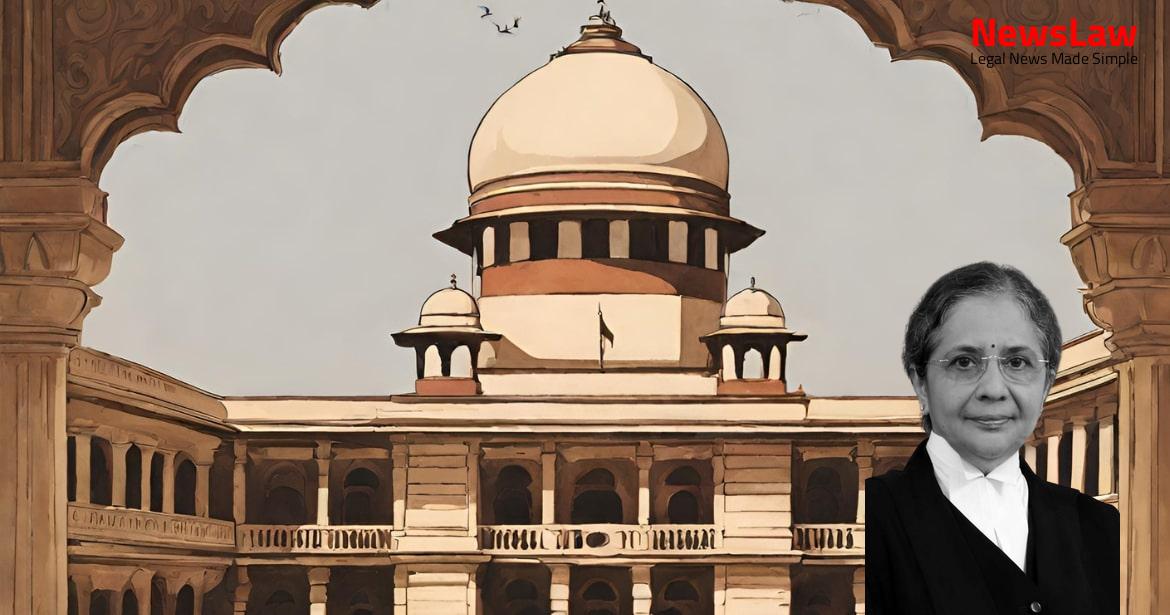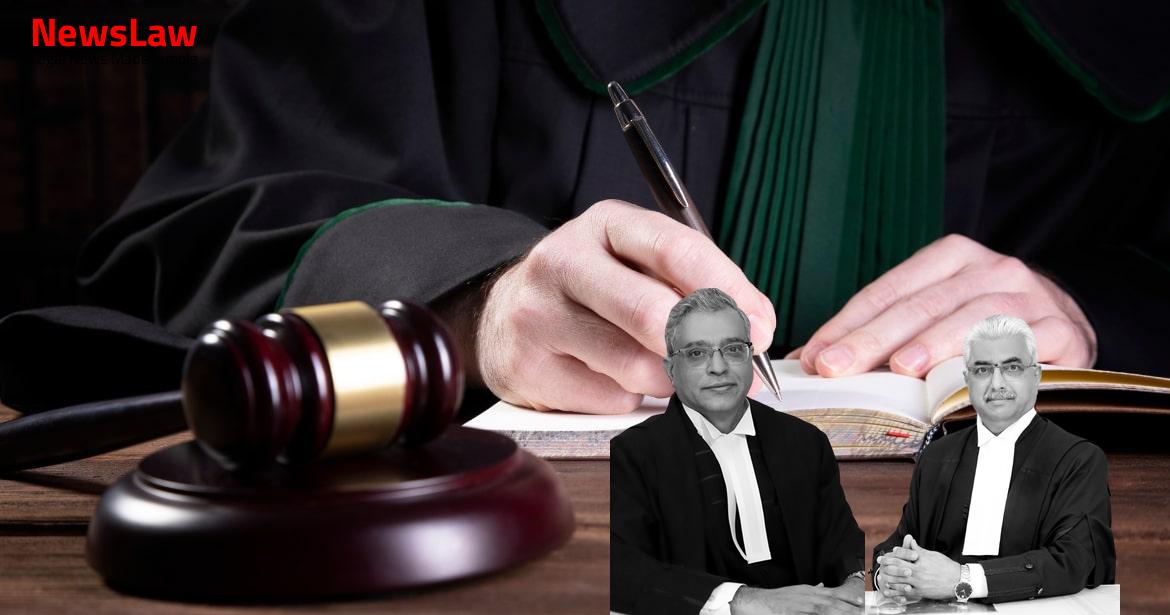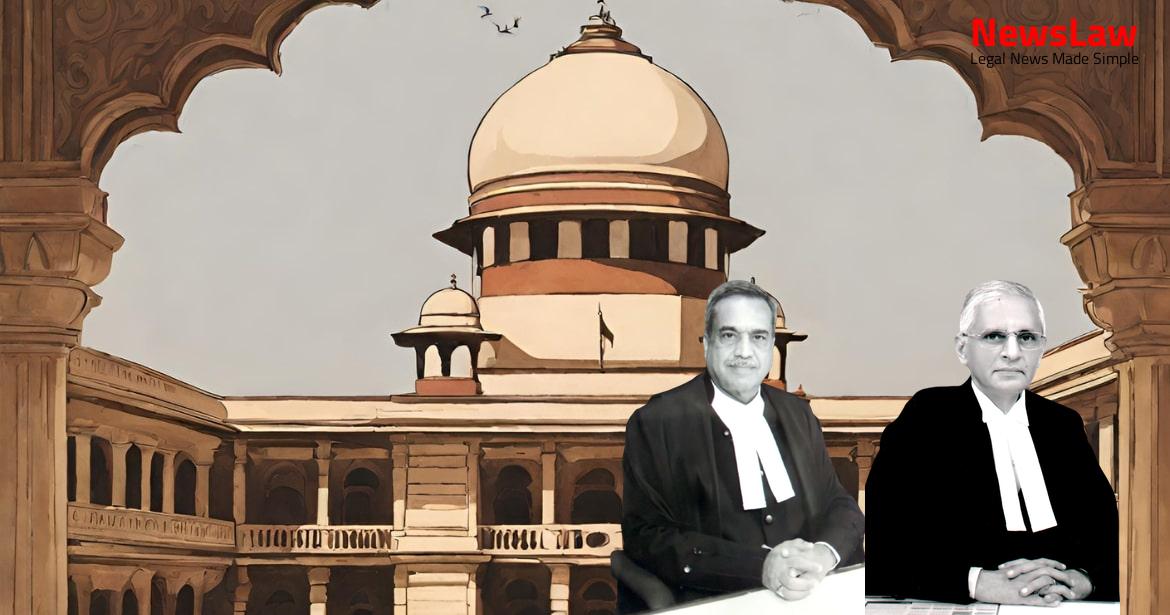The court’s analysis of Section 43B of the Income Tax Act sheds light on the pivotal distinction between debentures and interest payments. Through a detailed legal examination, the judgment explores the requirement for actual payment of liabilities, clarifying the application of Explanation 3C in cases where interest is converted into a loan. This summary delves into the essential legal considerations surrounding the deduction of interest payable, providing insight into the court’s interpretation of statutory provisions.
Facts
- Appellant claimed a deduction of Rs.2,84,71,384 under Section 43B for issuing debentures in lieu of interest accrued to financial institutions.
- Rehabilitation Plan involved issuing 300149 convertible debentures of Rs. 100 each totaling Rs. 3,00,14,900 in lieu of outstanding interest and other charges.
- Appellant filed a return of income declaring a loss of Rs.1,03,18,572 for the assessment year 1996-1997.
- Lead Financial Institutions approved the Rehabilitation Plan, effectively paying interest of Rs. 2,84,71,384 to the institutions.
- The Assessing Officer rejected the Appellant’s contention regarding the issuance of debentures not being as per the original terms and conditions of the loans.
- The Assessing Officer held that the interest was payable as per the revised terms at the time of default, making the amount ineligible for deduction under Section 43B(d).
- The Commissioner of Income Tax (Appeals) allowed the appeal and noted that the original agreements with financial institutions included a provision for the conversion of 20% of the default amount into equity capital at the lenders’ option.
Arguments
- The Appellant argued that liquidation of outstanding interest by issuing debentures was equivalent to actual payment of interest as per Section 43B of the Income Tax Act.
- The Appellant emphasized that debentures are actionable claims and can be sold in the market.
- Reference was made to the Cape Brandy Syndicate case to highlight the strict construction of fiscal and tax statutes, where the term ‘debenture’ was not specified in Explanation 3C.
- The Additional Solicitor General argued that Section 43B was introduced to prevent deductions based on a mercantile system of accounting, requiring actual payment to be made.
- It was emphasized that a debenture is essentially a loan, and in this case, interest was converted into a loan, falling within the scope of Explanation 3C.
- A judgment of the Supreme Court was referenced to explain the correct meaning of ‘debentures’ and how it relates to the interpretation of tax statutes.
- The non-obstante clause in Section 43B was highlighted as indicating its departure from other sections in the Income Tax Act.
Analysis
- The interpretation of Section 43B of the Income Tax Act is crucial in determining the applicability of sub-section (2) regarding understatement of consideration received.
- The provision aims to ensure actual payment of liabilities, not just their accrual or provision in accounts.
- Explanation 3C was added in 2006 to prevent misuse of the provision by converting interest into a fresh loan.
- Debentures issued in lieu of interest were considered as an actual payment under a rehabilitation plan.
- The High Court judgment erred in concluding interest was converted into a loan, ignoring the factual agreement between the parties and the actual payment through debentures.
- Section 43B mandates deduction only on actual payment, not on mere account accrual.
- The insertion of Explanation 3C clarifies that interest converted into a loan is not deemed as actual payment.
- Secured loans, including debentures, must be shown as liabilities in the balance sheet.
- The interpretation of statutes must align with the factual arrangements agreed upon by the parties.
- The Section does not prescribe a particular mode of payment for interest, unlike other statutory liabilities like P.F. and ESI contributions.
- Explanation 3C is clarificatory and does not add a new condition retrospectively.
- Any ambiguity in the language of Explanation 3C shall be resolved in favor of the assessee.
- The High Court’s view on debentures being treated as a provision instead of a reserve was deemed erroneous.
- The legal definitions of ‘provision’ and ‘reserve’ as per the Companies Act were emphasized.
- Judicially defined ‘earned in India’ as income “arising or accruing in India.”
- Actual payment is essential for the applicability of Section 43-B.
- Interest due offset against a subsidy is not a conversion into a loan or borrowing as per Explanation 3C.
- The obligation to repay a loan is considered a present obligation.
- The law in force during the relevant assessment year applies unless otherwise provided expressly or by necessary implication.
- Explanation 3C clarifies that interest payable must be actually paid for deduction.
- The court’s decision is influenced by the presence of Explanation 3C which places conditions on deduction of interest payable.
- Funds lent to repay interest do not qualify as actual payment under Section 43B.
- Contractual agreements between parties should be considered in determining liability discharge for tax purposes.
- Section 43B of the Income Tax Act states that certain deductions will only be allowed on actual payment.
- This includes deductions for interest payable on loans from public financial institutions, State financial corporations, or State industrial investment corporations.
- Explanation 3C clarifies that interest payable under Section 43B(d) must be actually paid to be allowed as a deduction.
- The deduction for such interest shall be allowed in the year it is actually paid by the assessee.
- However, if the interest payable has been converted into a loan or borrowing, it will not be deemed as actually paid.
- The deduction is not allowed if the sum is paid after the due date for furnishing the income tax return for the relevant previous year.
- The ASG did not rely on a particular part (PRE_NOT_RELIED) of the judgment.
- This section of the judgment was not considered in the argument presented by the ASG.
- The ASG focused on a different part of the judgment in their submission.
- The High Court did not consider Explanation 3C in the case in question.
- The assessing officer rightfully disallowed the deduction claimed by the assessee.
- The ITAT and the High Court erred in reversing the disallowance.
- Explanation 3C was applicable in the case referred to as outstanding interest had not been paid and a new credit entry of loan was made.
- The present case is different as there was no mention of similar facts.
- The judgement cited is not applicable to the present case.
Decision
- The impugned judgments of the High Court are set aside
- The judgment and order of the ITAT is restored
- The appeals are allowed
Case Title: M.M. AQUA TECHNOLOGIES LTD. Vs. COMMISSIONER OF INCOME TAX, DELHI – III (2021 INSC 397)
Case Number: C.A. No.-004742-004743 / 2021



